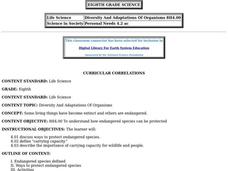Curated OER
Creatures That Glow In The Night
Students investigate the different bioluminescent organisms. They use microscopes in order to make observations and draw what is seen. Students demonstrate they have studies the differences between the process of photosynthesis and...
Curated OER
Bioluminescent Bewilderment!
Ninth graders investigate the concept of bioluminescent. They break down the word phonetically for correct pronunciation. This is done as a warm up for learning. Then students create a list of the creatures from prior knowledge and...
Curated OER
But I Need This
Third graders place everything in their desk or back pack onto their desk top. They explain why each item is needed. They receive a set of pictures and write a list of things each person or animal needs to survive. They compare people,...
Curated OER
The Tank
Students have a better grasp of the ecosystem of the St. Mary's river. They analyze how the tank is meant to be a miniature of the river. Students inquire how to take care of the tank and its inhabitants. They are introduced to Fundulus...
Curated OER
Introduction to Organisms of the St. Mary's River
Students identify how the tank functions, what organisms are in the tank, and why each component of the tank is important. They are introduced to the organism eelgrass. Students explore the organism Fundulus.
Curated OER
Food Webs in the Bay
Students get acquainted with a type of ecosystem and how different organisms of that ecosystem compete with one another for resources. They analyze the submerged aquatic vegetation of a bay ecosystem. Students study plants.
Curated OER
Life's Big Questions: Where Did Life Come From?
Students explore the life forms that live in the hot springs of Yellowstone. They examine how microscopic creatures can survive in these extreme conditions. Students perform experiments to observe growth samples and demonstrate how a...
Curated OER
You Belong in the Zoo Project - Using HyperStudio
Students explore the diversity of living organisms. They research an animal found in the zoo and plans a 10-card HyperStudio project about his/her organism.
Curated OER
Classification
Students work in groups of 4-6 for the experiment/activity part of this exercise. They classify ten animals using the information on the picture to group the animals. Students develop descriptions, explanations, predictions, and models...
Curated OER
The City From the Ooze
Students investigate the life in the mud found around ponds. They create Ooze City using pond mud. Students investigate the various layers that form and what type of organisms are in the mud.
Curated OER
In Your Own Backyard
Pupils observe organisms in their habitat and record their observations. They then draw conclusions about the organism's habitat needs and food sources.
Curated OER
Odyssey of Life, Part II-The Unknown World
Students complete an experiment in which they observe different natural sample in which they uncover the microbial world. They complete a two part worksheet that accompanies the lesson plan.
Curated OER
Urinalysis
Students participate in a lab experiment that explains why doctors take urine samples. They participate in a discussion about the urinary system and have already studied the functions of the organs involved in the urinary system along...
Curated OER
Diversity and Adaptations of Organisms
Eighth graders discuss ways in which to protect endangered species. They examine the concept of carrying capacity. They discuss the importance of carrying capacity for wildlife and people.
Curated OER
A Tough Neighborhood
Students describe at least three attributes of the deep ocean physical environment that are radically different from ocean habitats near the sea surface.Students explain at least three morphological or physiological adapt
Curated OER
What's Bright Red and Invisible?
Learners study that very little sunlight penetrates the ocean below depths of 200 meters. They study that no light penetrates the ocean below depths of 1000 meters. They study that the quality of light changes as depth increase
Curated OER
Who's for Dinner?
Fifth graders examine life systems within different biomes. They choose paper plates with the names of animals on them. They research the animals, write reports and draw pictures of them. They create a food chain model by arranging the...
Curated OER
Comparing Apples and Oranges
Fifth graders, in groups, examine different types of apples and how they are different. They also taste the differences of each apple. They use this lesson to explore how to make observations.
Curated OER
Using Adjectives to Describe Observations
Seventh graders write observations of organisms based on both audio and video sources. They describe organisms which they view using appropriate adjectives.
Curated OER
A Tale of Two Reactors
Tenth graders role-play as members of the food chain. Sticky tables acting as polluting factors are introduced and members of different trophic levels suffer varying degrees of damage due to those pollutants.
Curated OER
Leaving Home
Students explain the importance of larval dispersal and retention to populations. They collect data on organisms and examine it.
Curated OER
And Now for Something Completely Different...
Students identify organisms that are typical a part of a hydrothermal vent. They examine why hydrothermal vents are short-lived.
Curated OER
Three Cold Realms
Students identify organisms within the realms of pelagic, benthic and sea ice. They explain how these three interact with each other.
Curated OER
Motte Rimrock Reserve: Lesson Plan for Flora
Students study the flora of Motte Rimrock Reserve while observing organisms in their natural environment. They use a dichotomous key to identify plants.

























